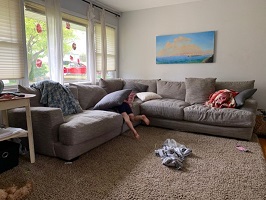Class Exercise for Week of April 20
This week we are going to examine the passage of time. We tend to assume that since a drawing is a
static image – it doesn’t move – that it can’t express any ideas beyond that of
a snapshot photo. We think of video as
being the medium that expresses the passage of time. However, we are going to make two drawings
this week that will start to get at ideas beyond that of a snapshot image.
Exercise #1: The Chair
Choose someone to be your model. Don’t worry, they’ll only need to pose for
photos. Then find a stool or small chair
and place it in the middle of a well lit room.
Have your model sit on the chair and photograph them from at least 15
feet away. Now, do not move the chair
but have them take at least 4 more poses (at least 5 total) on or around the
chair, and photograph them from the same spot as the first photo. Again, don’t move the chair and take all
photos from the same spot.
On an 18x24 sheet of drawing paper, make a drawing of the
chair from your photos, and superimpose all 5 model poses onto that same
chair. Your composition should fill the
page, but be sure to allow for space around the chair for your model to exist
in! The key for this to work is to use the chair to register the scale of the
figure. Make sure the figure overlaps
and interacts with the chair in your drawing the same way it does in each
photo. As the figures overlap each
other, it’s going to become more and more difficult to tell where one figure
ends and the next one begins. That’s
okay! Embrace the uncertainty to make an
interesting drawing!
Exercise #2: The Room
Now you are to choose part of a furnished room to make a
similar exercise. You must be able to see the whole section from a single
viewpoint at once. Have your model take at least 5 poses in and around this
section of the room. Then make a single
drawing of the section of the room with all five model poses existing in the
same space, paying particular attention to the appropriate scale of each
figure. The poses that are closer to the
viewer will appear larger than the poses further away. Use the furniture (don’t
move it!) to register the scale of each figure. Trust your measurements!













No comments:
Post a Comment